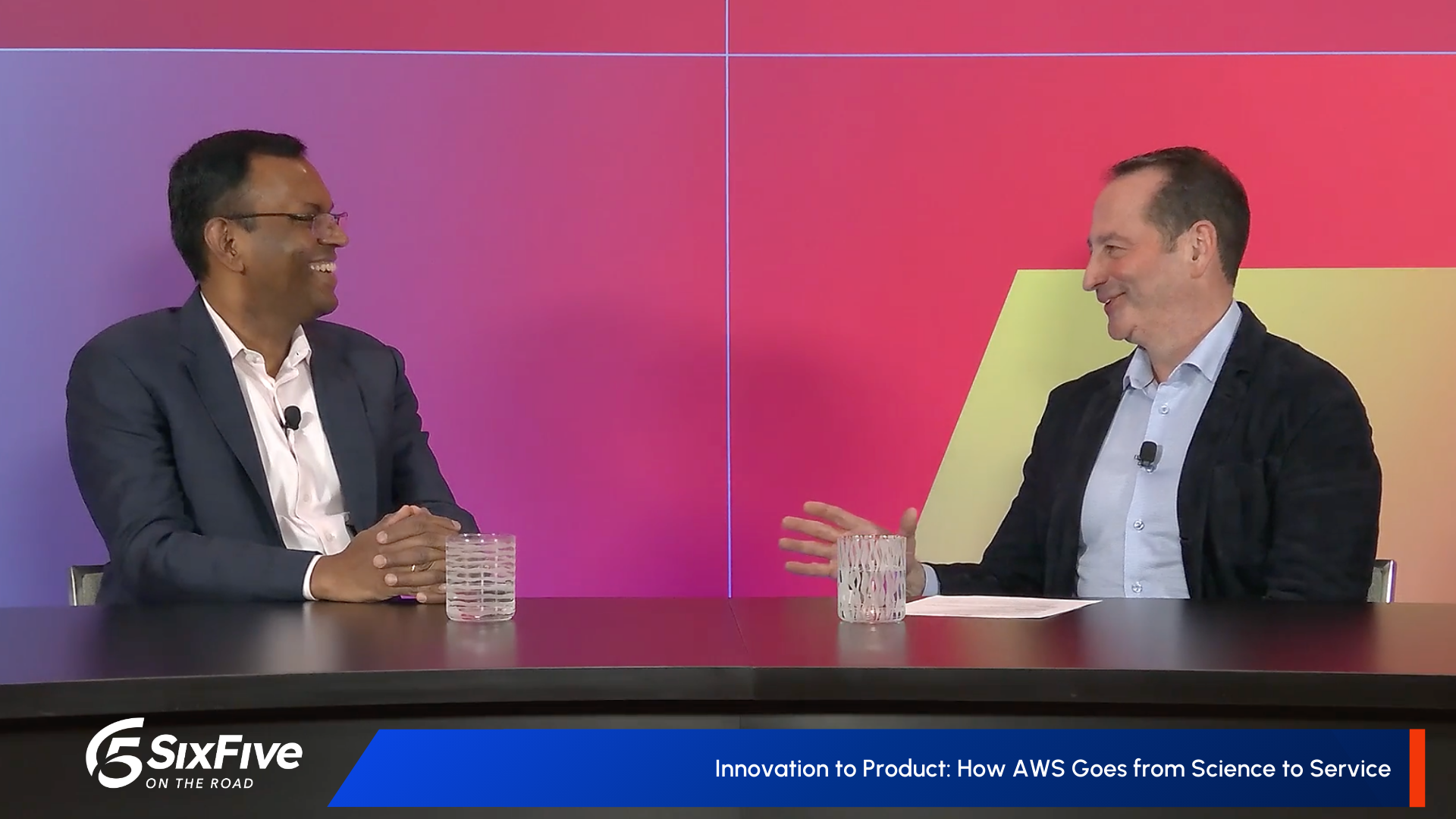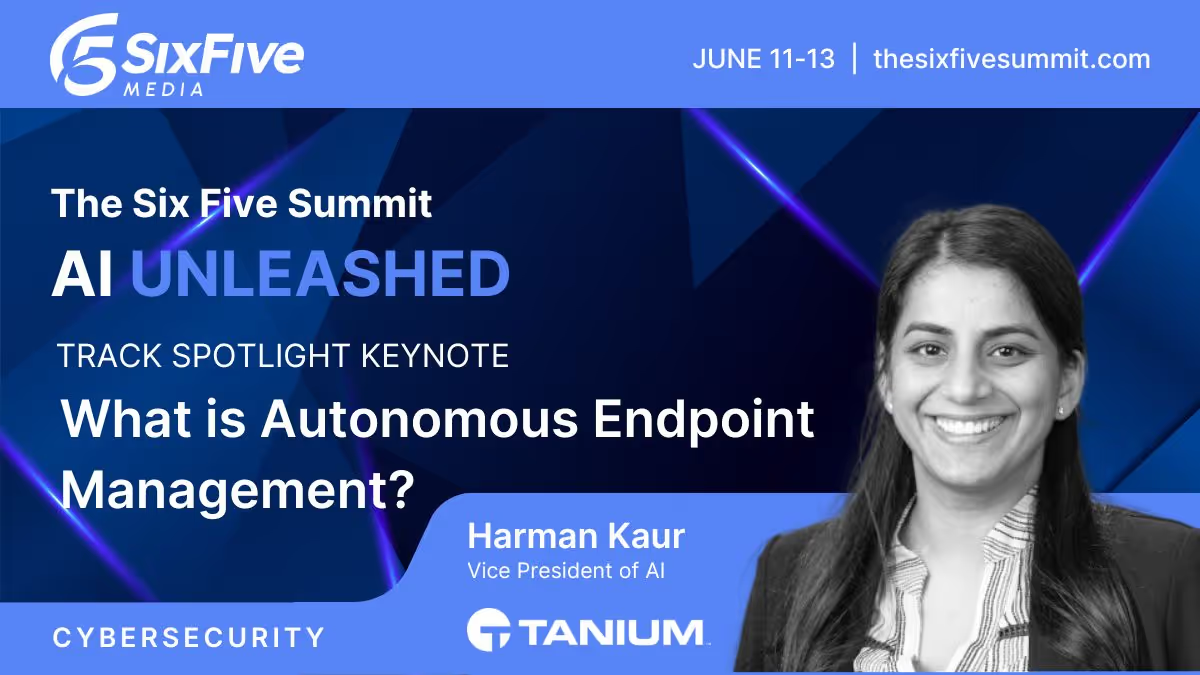Liquid Cooling at the Forefront: Redefining Performance Standards – Six Five On The Road
Darren Burgess, Business Development Director at Castrol ON Liquid Cooling, and Bharat Vats, CEO at ECS, join David Nicholson to discuss how strategic partnerships and innovative liquid cooling solutions are reshaping performance and efficiency standards for data centers.
Liquid cooling has officially moved from niche to necessary in the era of high-density compute. The real question now is: Who’s building the integrated solutions and partnerships that can keep pace with AI-era demands?
From SC25, host David Nicholson, Global Technology Advisor at The Futurum Group, is joined by Castrol ON Liquid Cooling's Darren Burgess, PhD, Business Development Director, and Electronic Cooling Solutions (ECS)'s Bharat Vats, President & CEO, for a conversation on Castrol ON Liquid Cooling’s comprehensive approach to tackling the performance and efficiency challenges facing data centers through innovative liquid cooling partnerships and solutions.
Key Takeaways Include:
🔹Addressing customer challenges: Understanding the major pain points for data center operators, including efficiency, uptime, and evolving demands, and how Castrol ON’s liquid cooling solutions address them.
🔹Importance of effective liquid cooling: Why choosing the right solution is crucial for ensuring reliability and scalability in high-density environments.
🔹End-to-end service capabilities: How Castrol ON provides integrated, seamless service from design to ongoing support for data center cooling needs.
🔹Strategic investment and partnership: Insights into Castrol ON’s collaboration with ECS and how this enhances technical innovation and market reach.
🔹Unique differentiators: The specialized capabilities ECS brings to Castrol ON, setting their joint offering apart from other liquid cooling providers.
Follow Castrol ON Liquid Cooling for more information.
Watch the full video at sixfivemedia.com, and be sure to subscribe to our YouTube channel, so you never miss an episode.
Or listen to the audio here:
Disclaimer: Six Five On The Road is for information and entertainment purposes only. Over the course of this webcast, we may talk about companies that are publicly traded, and we may even reference that fact and their equity share price, but please do not take anything that we say as a recommendation about what you should do with your investment dollars. We are not investment advisors, and we ask that you do not treat us as such.
David Nicholson:
Welcome to SC25 in St. Louis, Missouri. That is the supercomputing conference to end all supercomputing conferences. And again, it's in St. Louis this year, the home of the supercomputing organization. I'm Dave Nicholson with the Futurum Group and Six Five Media. This is Six Five in the booth. I've joined a team from a very interesting company that a lot of you are familiar with, but maybe not familiar with what they're doing in this space. And that company is Castrol. You've heard of them all. You could even be a NASCAR fan and you've heard of Castrol. But we're going to be talking about cool stuff in the data center realm. I have the CEO of Electronic Cooling Solutions, Bharat Vats, joining me. Vats, great to have you here. I also have Darren Burgess, who is Business Development Director for BP Castrol. Welcome, both of you. Thank you. I want to start with you, Darren. Let's just dive right into the biggest challenges that you're seeing customers having and how Castrol is solving them.
Darren Burgess:
Yes, so let's maybe focus on what's most important right now prior to this conference and to hyperscalers, to AI particularly, and that's liquid cooling. That's where we are. And so in the United States particularly, liquid cooling direct-to-chip, which and then the liquid is known as PG25, propylene glycol 25%, water 75%. And we're just getting into really large deployments, full data centers of PG-25 and direct-to-chip cooling. And so, you know, the biggest challenge is people don't know what they don't know. There's a lot of complexity in the fluid. You would think a propylene glycol kind of like antifreeze, water is water, how complicated can this be? But there's a lot of materials, chemistry, a lot of small channels, a lot of possibilities where this fluid can kind of get away from you. And so helping people, you know, by developing some really strong internal technical know-how to help the fluid be stable and to keep the lifetime so that you don't have to shut any part of that AI center down because, of course, that's big money.
David Nicholson:
So I want to highlight that because I'm going to ask you a question that sounds like you just touched on it. But why do people need to care about that? Why is it so important that it be the right liquid cooling solution? And when I say solution, there are two ways to think of that. There's literally the liquid in the solution. Sure. And then there is the overall solution. But why is that so important?
Darren Burgess:
So, I mean, just think about the liquid. I mean, you can have all levels of redundancy in a data center. One thing you can't have redundancy in is the liquid. It's literally a single point of failure. And so it's the lifeblood. You can't let that get away from you. It has to be healthy in order for the cooling to keep going. You can't cool an AI server with air. You've got to have liquid cooling. And so that's really how central it is.
David Nicholson:
And this isn't just about the liquid itself, as far as Castrol is concerned. So tell us about your end-to-end service capabilities. What do you do kind of comprehensively in the cooling space?
Darren Burgess:
Yeah, so, you know, initially we're focused on installation so we can help you put the liquid in, make sure it's stable from the beginning, right? It's a lot of chemical tests, parameters that you want to look after, pH, conductivity, that type of thing that determines the health of the fluid. How often do you test up front to make sure everything's stabilized? How do you test over the lifetime? Are you staying quarterly? Do you get to biannual? Do you have real-time monitoring? and then, you know, someday you may want to take things down, change some things out, help you either get rid of the fluid or, you know, possibly recycle it. So sort of an end-to-end with the fluid and, you know, expand out from there with, you know, testing, monitoring, that type of thing.
David Nicholson:
So fair to say it's a bit more complicated than barrels and funnels?
Darren Burgess:
It's just a smidge there, yeah, just a little.
David Nicholson:
Vats, let's turn to a bit of the business side of things. Tell us about Kastrol ON's strategic investment in ECS. How did that come about? First, let's define those terms. Kastrol and ECS, what's the relationship there?
Bharat Vats:
Well, first of all, Dave, thank you for me having you here.I appreciate that. Kastrol, well, this investment is a milestone for ECS. Think about a company like Castrol that breaks 125 years of experience handling all these so-called oil and the fluids in the space. And a company like ECS, almost three decades of testing, validation, modeling, you can't find a better synergy, right? So I think it's highly synergetic, right? It's a great strategic investment by Castrol that enables ECS to expand their capabilities, right? We've been a small company. Now we're going to go to the next level. And also, it helps us to handle the complex and more bigger projects the company could not handle earlier, right? The way I see it is this. The engineering expertise that Castrol brings in this space from the fluids and the testing and validation capabilities of ECS is not only going to help these two companies but also all these customers in AI, high-performance computing, and all these spaces, right, data center servers, that will get real benefits, right? Fully tested, fully proven products that you can rely upon.
David Nicholson:
So you talked about some of the ways that ECS benefits from the investment of Castrol. You may have left one out. Tell me if I'm right guessing this. Now when you tell people you're with Castrol, they go, oh. Because maybe not as many people have heard about ECS. So brand recognition. Is that fair? It is. Let me tell you this.
Bharat Vats:
I think it's both ways, right? And we've been known very, let me use the right word, very secretly, the big five customers. They have been customers of the big fours with ECS. OK. But now with this, there's a lot of brand equity that we get added with this investment, right? We never had that. It brings the trust of our existing customer to the bigger hyperscalers that Kestrel trusted ECS, right? The solutions are trusted and tested, right? We carry that goodwill on our head now. When we go and talk to those bigger customers, we get an opportunity to get bigger projects now.
David Nicholson:
Yeah, good point. Yes, Castrol does bring the brand recognition, but the people who knew ECS knew it as a trusted brand before. Talk about the unique capabilities that ECS brings to the table. That really differentiates this, because the natural inclination of folks in the data center are going to be thinking, it's fluid. Darren went into some of the reasons why that's not the case, that it's critically important to get it right. But how do you differentiate yourself in this space?
Bharat Vats:
Well, the way I see it, ECS brings 27 plus years of unrivaled depth of experience, right? We've got engineers, PhDs working, not just once, multiple times on the solution that has been newer kind of, you know what? And the second one is the breadth of industries. You talk about automotive, you talk about medical, you talk about defense, the list goes on. see the applications that ECS has been handling. ECS has been doing all testing of TIMs, called Thermal Interface Materials, the primitive grease, and then graphenes, and moving towards cold plates, and now we talk about liquid cooling, right? So I think this helps us a lot to position ourselves as a prominent engineering and consulting company for the liquid cooling testing.
David Nicholson:
Yeah, it makes a lot of sense. Darren, with your background, is there anything surprising to you about the way that liquid cooling is being implemented in data centers? Or is this just all thermodynamics and pretty straightforward? Anything crazy about going into the world of cooling data centers for you?
Darren Burgess:
I think what is most surprising to me, given my background in chemical engineering and materials science, is just how complex of a materials chemistry problem it is. There are so many materials involved in the whole cooling loop and the possibilities to have particulates for anti-corrosion to go wrong, to have some kind of foaming. It's a very precarious liquid. can really get away from you in terms of quality quite easily if everything's not maintained. Now, if you're very strong and steady with the installation and the testing from the beginning and really pay attention, high quality water, et cetera, could be maintained for years. But it really takes a special level of attention. And I think when you're looking at a $300,000 server and therefore potentially a billion and a half in hardware in the data center, the relative cost of the fluid, hey, it's water and antifreeze. How complicated can this all be? But as I said, single point of failure. You need to be careful.
David Nicholson:
Yeah, and if you look, Vats, if you look at some of the designs for comprehensive liquid cooling systems, steampunk is the first word that comes to my mind. And we all sort of assume that the people who are building these things know what they're doing. But I'll tell you, this is the first time that I've heard reference to this idea that you're talking about this fluid going through and touching different materials. It's not just a stainless steel pipe. You've got all sorts of fittings and connectors and materials that are all at different temperatures, at different pressures. So there's an incredible amount of complexity to this. Any of that make you want to run for the hills? I mean, this is the first time that we're going to hear about one of these 10 gigawatt data centers not catching on fire, but having liquid damage. You know, how soon is it going to be before we're in that space? Does any of this make you nervous?
Bharat Vats:
Well, I think it's exciting. I see both challenges and opportunities here, right? This thing never existed before in the history of the Earth, right? It happened for the first time. And it's happening at lightning speed. It's changing, right? Just like a couple of years ago, Look at the server, the rack size. Look at the rack size now. We're talking in gigawatts. The problem is that it's becoming more and more denser, right? And the more density of the power goes up, the more heat that generated, the traditional cooling systems cannot handle that. Like my friend said, air cannot handle it. Water cannot handle it. You need specific solutions for that. And when you have those liquid solutions, you need an arrangement where it can go without leaks, to your point earlier, right? Or is it contaminated? Or it's corroding something, right? Since this is new, you need a testing partner that can tell you, yes, this is going to work, or this is not going to work, right? And that's where companies like ECS come into play with Castrol. We got this liquid. We've tested this liquid under several hundreds of hours of testing. And we can tell you this, this is going to work. You can rely upon it.
David Nicholson:
Darren, is there one, is there, when I think, again, I know, bear with me, being sort of a petrol head, I think in terms of weights of motor oil, as an example, are there variations depending upon the materials that the liquid will be going through, or is there essentially one formulation of the cooling liquid that's gonna go into a cooling loop?
Darren Burgess:
Yeah, so focusing on the directed chip, and it really is the one basic formulation. You need the 25% propylene glycol to be anti-biofouling. Okay. So you actually keep any kind of bacteria growth, et cetera, from getting away from you by having the 25% PG. Is it possible to do pure water? It is, but you better quadruple the intensity of your monitoring and your fluid quality program, etc. Go with the PG25. A couple of different ad packs out there. There's inorganic additive technology, organic additive technology are kind of the two big camps. But really, as I was mentioning earlier, you kind of come back to what is your total technical knowledge of how things can go wrong and what are you going to do if they start to go wrong in order to keep the data center operating.
David Nicholson:
Okay, and Vats, a little bit of a random question here, but we're talking about cooling loops where you're transferring heat, you're dissipating heat from these semiconductors using liquid. What about immersion cooling? Do you have a view in terms of where that's going to go, or do you think that this sort of direct-to-chip cooling is gonna be the primary way forward?
Bharat Vats:
I think this question is my personal one, Dave, I must tell you this, because I always try to answer this question to myself every day, right? Right now, I think it's still the base on the loads, the base on the power densities. I think the current liquid cooling system is sufficient, but as we go denser and denser, to your point, exchanging heat is not just the one problem. How fast you can exchange it, right? And that's where this emergent cooling comes into the play. As I said, it needs testing. It needs to be proven. It's going to work or not. Liquid cooling has already been proven. Immersion cooling needs to prove that.
David Nicholson:
Is immersion cooling a space that you play in? Do you have fluids for immersion cooling? Absolutely. So for you, it's a question of fit for function, whether it works. And then, of course, I've had conversations with folks talking about dissipating one megawatt worth of heat from a rack, and they show me the kind of pressure and flow that's required. And now you start thinking about anybody who's had a radiator hose blow in their lifetime kind of scenario.
Bharat Vats:
It's just not the question of heat transfer, right? Darren can talk more, he's a chemical engineer. At those temperatures, your coolant also decomposes, changing the characteristics, right? You've got to take care of that as well. So this needs a liquid cooling and immersion depends on how dense the racks are.
David Nicholson:
It's crazy, there was a time when only gamers had their liquid cooled systems next to their desks and we all teased each other because we were nerds. And now the reality is liquid cooling is becoming table stakes for some of this stuff. Thanks so much, both of you gentlemen, for talking about this. It's a fascinating subject. On behalf of Castrol and Six Five Media in the booth, I'm Dave Nicholson. Thanks for tuning in and stay tuned for more interesting coverage of SC25 and everything in the tech sector.
MORE VIDEOS
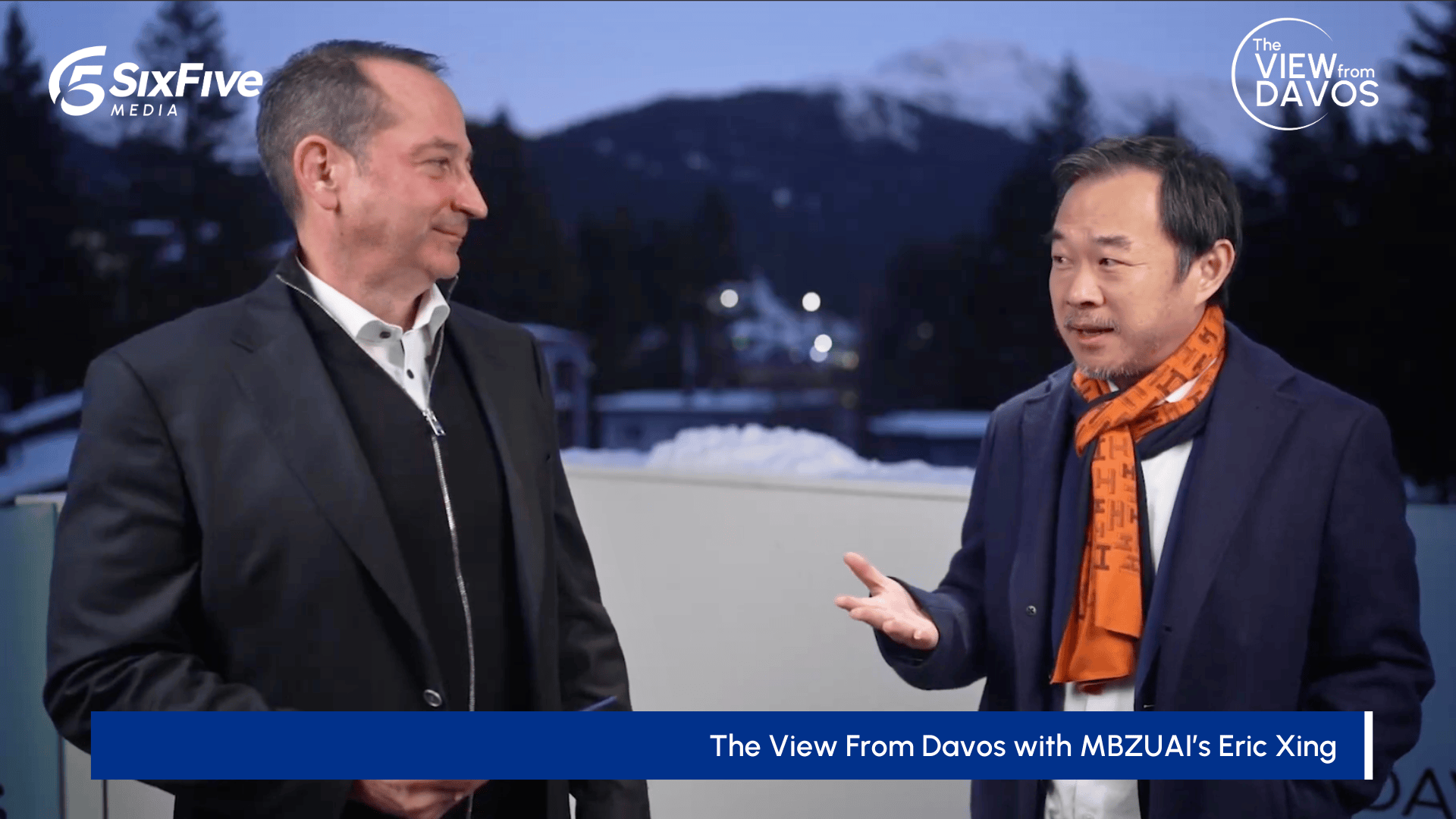
The View from Davos with MBZUAI’s Eric Xing
From Davos, Patrick Moorhead speaks with MBZUAI President Eric Xing about why world models may define the next frontier of AI research, how to recognize progress beyond narrow intelligence, and what role universities play in balancing innovation, openness, and responsibility.

The View from Davos with Wedbush’s Daniel Ives
Daniel Ives of Wedbush Securities joins Daniel Newman from Davos to discuss why AI adoption is entering a monetization phase, how enterprise software and modernization are driving ROI, and why the current cycle looks more like the early stages of a long-term buildout than a speculative bubble.
Other Categories
CYBERSECURITY

Threat Intelligence: Insights on Cybersecurity from Secureworks
Alex Rose from Secureworks joins Shira Rubinoff on the Cybersphere to share his insights on the critical role of threat intelligence in modern cybersecurity efforts, underscoring the importance of proactive, intelligence-driven defense mechanisms.
QUANTUM
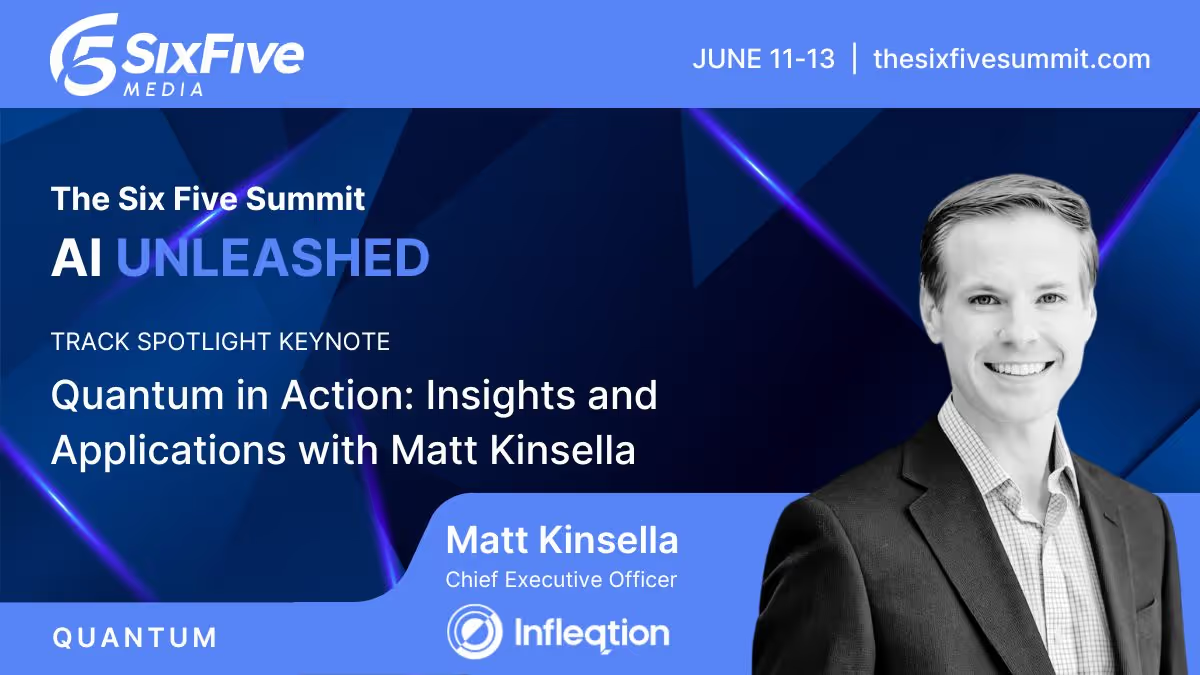
Quantum in Action: Insights and Applications with Matt Kinsella
Quantum is no longer a technology of the future; the quantum opportunity is here now. During this keynote conversation, Infleqtion CEO, Matt Kinsella will explore the latest quantum developments and how organizations can best leverage quantum to their advantage.
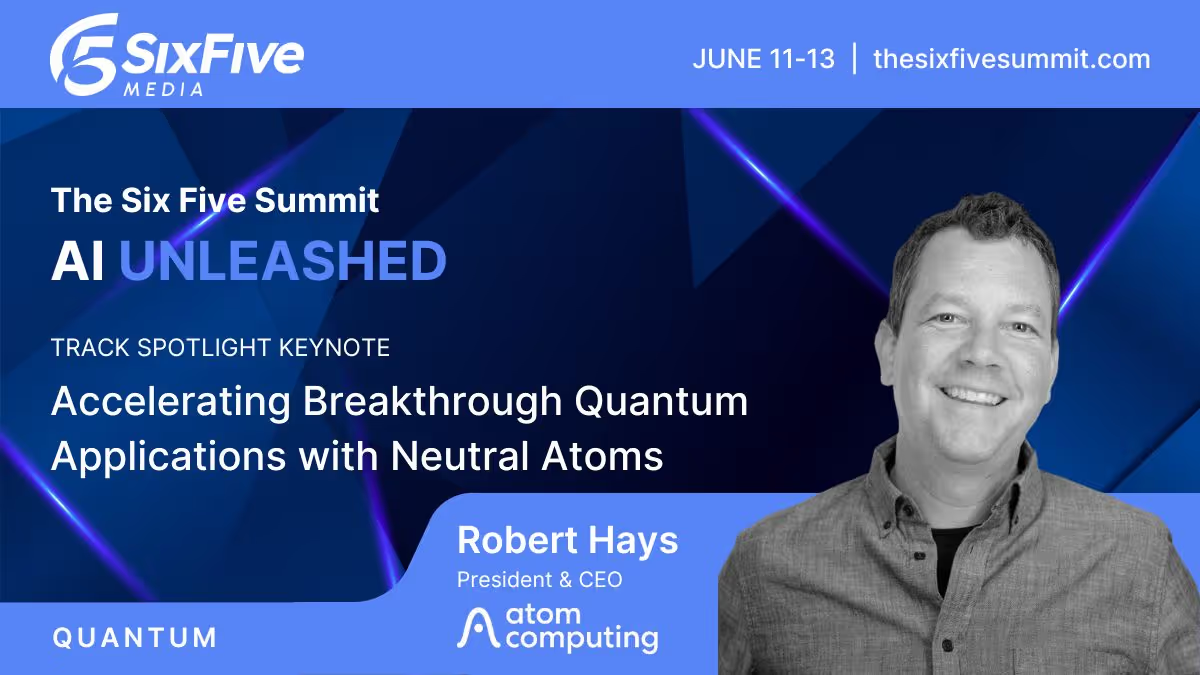
Accelerating Breakthrough Quantum Applications with Neutral Atoms
Our planet needs major breakthroughs for a more sustainable future and quantum computing promises to provide a path to new solutions in a variety of industry segments. This talk will explore what it takes for quantum computers to be able to solve these significant computational challenges, and will show that the timeline to addressing valuable applications may be sooner than previously thought.



